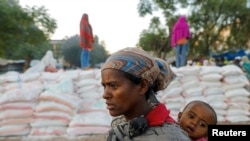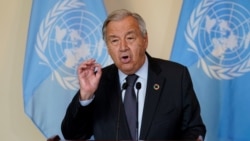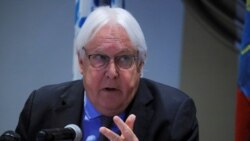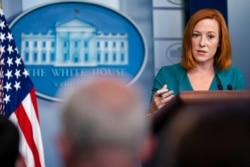The U.N. Children’s Fund says the Ethiopian government’s decision to expel seven senior United Nations humanitarian officials from the country is ‘regrettable and alarming.’
Declaring its work “is more urgent than ever,” UNICEF said in a statement Friday that children are bearing the “biggest brunt” of the country’s worsening humanitarian crisis.
“We have full confidence in the teams working on the ground to save children’s lives, guided – as always – by the principles of impartiality, humanity, neutrality and independence. Our programs will continue,” UNICEF added, noting it has been present in the African nation for more than 60 years.
The seven officials were given 72 hours to leave Ethiopia. They include the UNICEF representative and the deputy chief of the U.N. Office for Humanitarian Affairs.
In a tweet, Ethiopia’s ministry of foreign affairs said the seven were “meddling in the internal affairs of the country.”
On Thursday, U.N. Secretary-General Antonio Guterres expressed “shock,” after the Ethiopian government announced the expulsion.
“In Ethiopia, the U.N. is delivering lifesaving aid — including food, medicine, water, and sanitation supplies — to people in desperate need,” Guterres said in a statement. “I have full confidence in the U.N. staff who are in Ethiopia doing this work.”
He said the organization is engaging with the Ethiopian authorities “in the expectation that the concerned U.N. staff will be allowed to continue their important work.”
Conflict-induced hunger
The Ethiopian federal government has been engaged in an armed conflict with rebels in the northern Tigray region for nearly one year. The government declared a unilateral cease-fire and withdrew its forces in June, but the conflict has continued to spill into the neighboring regions of Amhara and Afar.
Of the 6 million people who live in Tigray, the U.N. says 5.2 million need some level of food assistance. Over 400,000 people are already living in famine-like conditions, and another 1.8 million people are on the brink of famine.
“It is critically important that the humanitarian operation continues, and it does,” OCHA spokesman Jens Laerke said Friday at a Geneva briefing, according to Reuters. “Until now there is no indication that it (Ethiopia’s decision) stops the operation.”
U.N. human rights spokesman Rupert Colville said at the briefing the expulsion of the head of its reporting team was a "really grave step.”
On Wednesday, U.N. Humanitarian Chief Martin Griffiths said that after 11 months of conflict and three months of a de-facto government blockade, the humanitarian crisis in Tigray is spiraling out of control.
In an interview with the Associated Press, Griffiths said the humanitarian crisis in Ethiopia is a “stain on our conscience,” as civilians starve because aid workers are being blocked from getting enough supplies to them.
One hundred aid trucks are needed daily in the region, but in the past week, only 79 in total were allowed in, a U.N. spokesman said.
“Trucks carrying fuel and medical supplies still cannot enter into Tigray,” U.N. Spokesman Stephane Dujarric said Wednesday. “Trucks are waiting in Semera, in Afar, to travel to Mekelle.”
The federal government headed by Prime Minister Abiy Ahmed, a Nobel Peace Prize laureate, blames the rebels for blocking aid deliveries.
US condemnation
“The U.S. government condemns in the strongest possible terms the government of Ethiopia’s unprecedented action to expel the leadership of all of the United Nations organizations involved in ongoing humanitarian operations,” White House spokesperson Jen Psaki told reporters Thursday.
Earlier this month, U.S. President Joe Biden signed an executive order allowing the government to impose financial sanctions on those who prolong the Tigray conflict.
“We will not hesitate to use this or any other tool at our disposal to respond quickly and decisively to those who obstruct humanitarian assistance to people of Ethiopia,” Psaki said.
In a statement Thursday, U.S. Secretary of State Antony Blinken called for “an immediate reversal” of Ethiopia’s decision and said the work of the U.N. officials “is critical to the ongoing humanitarian relief effort” in the country.
“This announcement comes just days after OCHA Chief Martin Griffiths warned that a man-made famine is taking hold in Ethiopia,” Blinken added. “The expulsion is counterproductive to international efforts to keep civilians safe and deliver lifesaving humanitarian assistance to the millions in dire need.”
The U.N. Security Council will hold private talks Friday about Ethiopia’s decision, according to Reuters, citing diplomats.
The diplomatic sources said the United States, Britain, Estonia, France and Norway intend to raise the issue when the 15-member council meets behind closed doors. The sources said any aggressive action by the council is unlikely because China and Russia long have maintained the Tigrayan conflict is an internal matter.
Patsy Widakuswara and Margaret Besheer contributed to this report. Some information came from Reuters.








